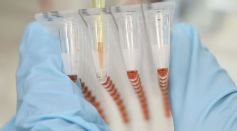Tags: CRISPR

China Develops Humanized Pigs to Simulate COVID-19 Infection for Future Testing of Vaccines and Drugs

Genome Editing for Microbiomes Available Soon Through New CRISPR Development
Multipurpose Mini CRISPR System Easier to Deliver Into Human Cells for Gene Therapy, Treat Rheumatoid Arthritis, Diverse Ailments
Protein Cell P53 Drug on Clinical Trials; To Restrore Cancer-Depleting Cell Function

COVID-19 Diagnostic Test Using Enzyme Being Developed in CRISPR-Based Research to Get Accurate Results in Just 20 Minutes

Sugary Success: First Precision Breeding of Sugarcane Through CRISPR/Cas9 Revealed in Two Studies
CRISPR Trial Successful Against Transthyretin Amyloidosis, Deactivates Genes of Untreatable Disease

Can CRISPR Switch Gene Controls Without Touching DNA? Here's What Experts Say
Enhanced CRISPR Gene-Editing Treatment Developed; Study in Mice Shows Potential to Reduce Cholesterol

CRISPR: Improving Methods of Gene Function Studies
Here Are the Top Technologies That Helped Experts Tackle COVID-19
New Gene-Editing Technology Repairs Mutation in Hutchinson– Gilford Progeria Syndrome
Everything You Need To Know About Gene Editing
India's New Paper Test for COVID-19 Could Change Everything

Scientists Warn Human Genome Editing Might Introduce Unwanted Genetic Defects

Scientists Create CRISPR-based Coronavirus Test That Gives Off Results in 40 minutes: It Works Like a Pregnancy Test
De-Extinction is On the Horizon Thanks to CRISPR
CRISPR-Cas9 Babies Have Lower Rates of Survival, Study Says
Using CRISPR to Uncover Critical Gene Fusions for the Growth of Cancer Cells
Scientists Discover New Method to Identify Off-Target Damage Caused By CRISPR
Most Popular

Ancient Hotspot Found to Have Created Great Lakes 300 Million Years Ago

Mysterious Structures Discovered Beneath the Pacific Ocean, Puzzle Scientists

Health Benefits of Drinking Hot Chocolate

Largest Known Volcanic Aquifer Discovered Beneath Oregon's Cascades





